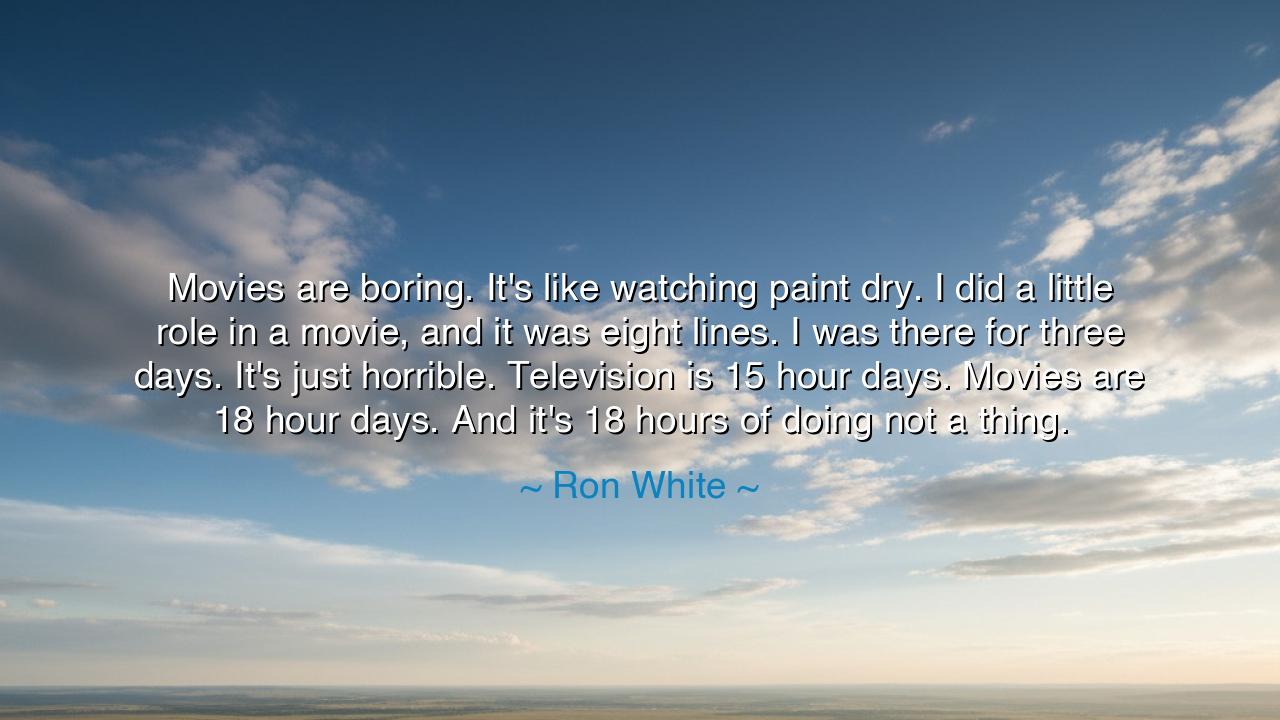
Movies are boring. It's like watching paint dry. I did a little
Movies are boring. It's like watching paint dry. I did a little role in a movie, and it was eight lines. I was there for three days. It's just horrible. Television is 15 hour days. Movies are 18 hour days. And it's 18 hours of doing not a thing.






Listen closely, O Seekers of Truth, to the words of Ron White, who offers an unvarnished look at the world of movies and television: "Movies are boring. It's like watching paint dry. I did a little role in a movie, and it was eight lines. I was there for three days. It's just horrible. Television is 15 hour days. Movies are 18 hour days. And it's 18 hours of doing not a thing." In these words, White speaks of the often-hidden reality behind the glitz and glamour of the film industry—a reality that, for many, is filled not with excitement or adventure, but with tedium, frustration, and repetition. His words resonate with a deeper truth about life itself: that much of what we do in the pursuit of greatness is not exciting or glamorous, but often consists of long, quiet hours of waiting, preparation, and inactivity.
In the ancient world, the great heroes of myth and legend were not just defined by their moments of glory, but by the struggles they endured in silence, away from the eyes of the world. Consider the journey of Odysseus, who spent years on the sea, struggling not only against external forces but with the quiet, unseen battle within. His adventures were not just moments of action but were filled with long stretches of waiting, uncertainty, and deep introspection. The ancient hero’s journey was not defined by the excitement of the battle but by the patience and resilience required to endure the long stretches of time where nothing seemed to happen. In much the same way, White’s reflection on the hours spent doing nothing in movies and television reflects the mundane reality that lies beneath every epic journey—whether on screen or in life.
Much like the ancient philosophers, who spent years in contemplation and dialogue to uncover the mysteries of the world, the artist's path is often one of delayed gratification. The great Socrates did not reach wisdom in a single moment of insight; rather, he spent his life questioning, reflecting, and learning through slow, careful thought. The same could be said of any artist or creator. They spend countless hours perfecting their craft, often unseen, with only a few moments of outward success or recognition. In White’s description, we are reminded that creativity often demands more patience and dedication than we expect. The external product—the movie, the play, the television show—is a mere fraction of the work that goes into it. The true challenge lies in the invisible work, the long hours of waiting and preparation that test the artist’s resolve.
Consider, too, the story of Michelangelo and his creation of the Sistine Chapel ceiling. While the end result is a masterpiece, few remember the years of solitude, physical exhaustion, and tedious work that went into its creation. For much of that time, Michelangelo worked with little outside recognition or praise. He was often alone, his body aching from the strain of long hours spent on scaffolding. His passion, his love for the art, pushed him forward even when the work seemed never-ending, even when the ceiling was merely a patchwork of unfinished images and raw sketches. Like Michelangelo, White’s words remind us that the end product of any great work may be rewarding, but the journey to reach that product is often filled with monotony, sacrifice, and dedication.
This lesson, O Seekers, is crucial for all those who wish to create, to build, or to achieve: greatness is not always found in the moments of action or in the applause of the crowd; it is often built in the quiet, unseen moments when one is simply persevering, when nothing seems to be happening, but one is still putting in the work. Like the ancient warriors, who spent years preparing for battle, or the philosophers, who dedicated their lives to the pursuit of wisdom, we must learn to endure the quiet moments of our own journeys. Success is not always about constant excitement or progress; sometimes, it is about maintaining one’s resolve in the face of seemingly endless hours of waiting and preparation.
Let us not be discouraged by the quiet moments of our own journeys, O Children, but rather find the strength to persist in them. In life, much like in the world of movies and television, we will face long periods where little seems to change. But it is these moments that shape us, that prepare us for the moments when we must act, when we must step forward and show the world what we have created. Just as Odysseus endured the long stretches of time on his journey, so too must we embrace the waiting, the silent work, and the grinding hours that ultimately lead to our own greatness.
And so, O Seekers, remember this: it is not always the action that defines a person, but the patience and dedication with which they endure the quieter, more challenging times. The work we do in the silence, the unseen hours, will ultimately lead to the moments of brilliance. Like the great heroes and artists of old, we must learn to embrace the quiet times, knowing that they are the foundation upon which our ultimate triumph will rest. Success, after all, is not simply a matter of moments of glory—it is the result of countless hours of quiet, unseen work that prepare us for those moments when we are called to rise.






AAdministratorAdministrator
Welcome, honored guests. Please leave a comment, we will respond soon